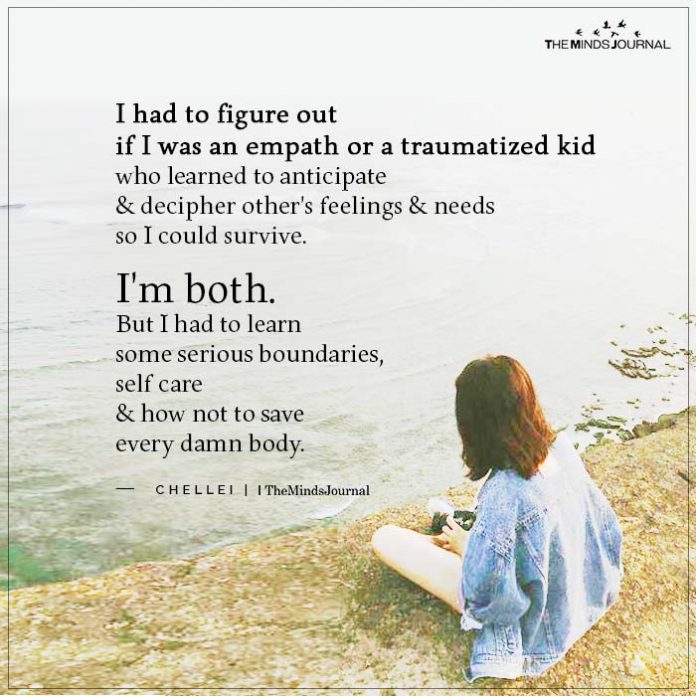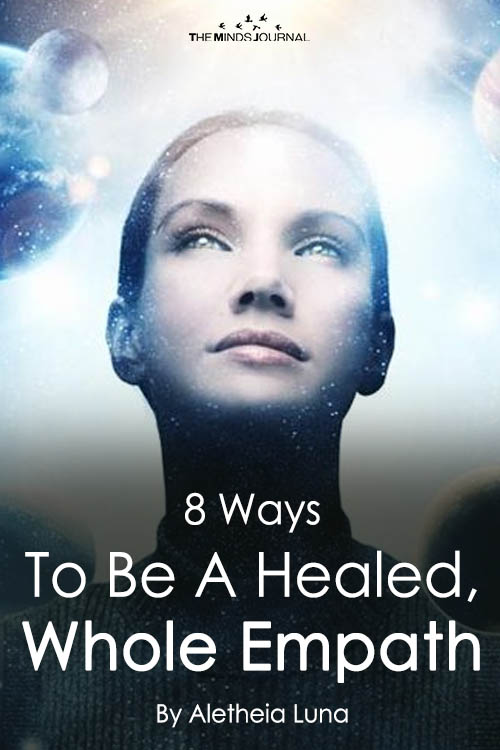Are you an empath who feels that they know everything there is to about being one? Well, there are more vital truths you can discover as an empath.
It is both a blessing and a curse to feel everything so very deeply. – Unknown
I’ve always known that a person’s energy reveals much more about them than their words do. As a child, I was the quiet, shy type that preferred to observe people rather than to get involved. I could pick up on and feel so many subtle nuances of meaning, so many imperceptible undercurrents of emotion and many implied but unstated, thoughts.
There was no doubt that people overwhelmed me. As a teenager, I grappled with the onslaught of my deep sensitivity to the world and paired with low self-esteem and poor boundaries I ploughed through many years of depression, confusion and intense anxiety.
Later, in my early 20’s – the years of my “awakening” – I continued to juggle relationships, work, education, and eventually chronic illnesses that came as a result of the constant emotional tension I was under and knew nothing of how to deal with.
People. Faces. Words. Meanings. Feelings. Sensations. Energy. Pain. I could feel it all, and it made me sick to the core. So at last it was with great joy that I stumbled across the term “empath” one day on my journey of self-discovery and healing, discovering that I wasn’t alone in what I was experiencing – and never was, to begin with.
Since then I have written a test on being an empath, and a few other articles including myths about empaths, empaths, and Spiritual Awakening and the 10 types of empaths. Collectively across all of these articles, I have received hundreds of comments from readers all throughout the world detailing their joys, their pains, and their life experiences with empathic abilities.
Building from the collective knowledge of the many empaths I have spoken with, plus the lessons I have personally learned during my years of self-exploration and healing,
I want to share with you 8 of the most important truths to discover as an empath.
(If you want to discover whether you’re an empath, go to this article.)
1. It is not necessary to take responsibility for other people’s hurt.
If you are an empath you are finely tuned to the pain of other people, tend to internalize it as your own. Remember that there is only so much you can genuinely do to help other people. Of course, you can try to help them or guide them as much as you see fit, but at the end of the day, the person experiencing the original pain must be willing to help themselves for any true healing to occur.
Often our caring natures blind us to the fact that many people don’t want, or aren’t prepared to be fixed because they are content in the safety of their misery.

2. Go into your pain rather than trying to escape from it.
It sounds counter-intuitive doesn’t it, “going into your pain”! But it’s a very important step to releasing the pent up energy inside of you. When we are preoccupied with escaping, repressing, and avoiding our pain, we perpetuate the cycle of our suffering.
Rather than giving in to the temptation to run – stop – be still. Sit down and let yourself feel the fatigue, the confusion, the anger, the hurt. Only once you face the truth of the pain you feel can you then progress to the next stage of letting the suffering go.
3. Realize that as an empath, you are not immune to projecting your feeling onto others.
Let’s be honest here. Part of the appeal of identifying as an empath is that it sometimes provides a doorway of escape to us; an opportunity to pin the blame on others. Yes, you might soak up the emotions of others like a sponge, but that doesn’t mean that you are exempt from creating, and deeply experiencing, your own emotions.
It is all too easy to portray ourselves as victims in life, and much harder to take responsibility for our own happiness. A key realization on the path of healing as an empath is to learn to distinguish what WE are feeling from what OTHERS are feeling. And there isn’t always a clear-cut distinction.
Often you will find that you are feeling about 45% of the emotions, and others are feeling about 55% of the emotions, or you might be feeling 20% and others 80%, and vice versa.
Related: What it Really Means to be an Empath
4. Self-esteem plays a big role in your ability to deal with your empathic traits.
Empaths with low self-esteem will suffer much more than those with healthy and balanced self-esteem. Obvious? Perhaps. But not always. Being an empath can be confusing, and it can be very easy to blame the hopelessness and worthlessness we feel on the bombardment of stimuli we experience every day.
It helps to realize that the more love, respect, and trust you develop in yourself, the less you suffer, and those thoughts such as “I’m cursed,” “I’m so weird and different from everybody,” “I hate being an empath” and so forth, are all often products of low self-esteem.
Related: 10 Strategies To Protect Your Energy As An Empath
5. Being an empath is not the same as having empathy.
This was very difficult for me to learn. “I must have lots of empathy if I’m an empath, right?” was the assumption I used to make. But I was wrong. Thanks to my emotionally stunted upbringing I was a very sensitive child … and yet I lacked a lot of empathy for other people. Empathy is not compassion; it is not feeling sorry for people and wanting to help them. No.
Empathy is the ability to look beyond the superficial façade of what a person says and does, understand their situation, and understand their behaviors, beliefs, feelings, and values. Having empathy is about understanding people, and in the words of empathy revolutionary Roman Krznaric, it is about taking an “imaginative leap into the shoes of another.”
Empathy is very much an intellectual and emotional experience combined, whereas being an empath is a kinaesthetic, physical, and emotional experience. Yes, you might be able to share the feelings of another, but that does not necessarily mean that you understand the other person on a level deeper than emotions. Realizing that being an empath does not equal empathy helped me to grow immensely as a person.
6. Shielding is not an useful technique.
As a temporary technique, shielding can be helpful, but it is not a long-term solution. I’ve written about shielding to “protect” yourself before and how it uses the language of victimhood which is counterproductive to becoming a healed empath.
Shielding is essentially about resisting ether people’s energy and resistance only serves to continue the cycles of fear and pain within. Rather than fighting, open yourself. Allow yourself to experience the emotions, but also let them pass by not adopting them as yours. This takes time and practice. But non-attachment is a much better long-term solution.
Related: 5 Fundamental Truths I Learned About Life In My Journey As An Empath
7. Catharsis and body-mindfulness = Useful techniques.
As an empath, it is so important that you incorporate some consistent form of catharsis into your everyday routine to rid yourself of the stuffy energy you might be harboring. Favored forms of catharsis among empaths include journaling/writing, meditation, walking, and jogging. Other forms of catharsis include singing, dancing, screaming (privately), laughing, and crying.
It is also extremely beneficial as an empath to teach yourself how to get in touch with your body – I call this “body-mindfulness” or “somatic mindfulness.” Basically, learning to be in touch with your body is an excellent way of anchoring and grounding yourself in the present moment rather than getting lost in the flood of emotions and sensations that come your way.
Body-mindfulness is also a good way of learning to listen to your needs, as well as nurturing and taking care of yourself. I wrote more about how to practice this form of mindfulness here.
8. Everyone has the potential to be an empath.
… not just you and not just a select group of people. It is undeniable that empaths have beautiful and even at times supernatural gifts, but the real beauty is that these gifts are not just limited to an elite group of people.
I believe that this kind of sensitivity is our natural state of being, but through our cultural conditioning, upbringings, dogmatic beliefs, and mass desensitization we have lost touch with the authentic state of humanity which involves being finely tuned to each other. I’ve explored this topic more in-depth here.
Originally appeared on Lonerwolf
Written by Aletheia Luna
Being an empath is not always as easy and light, like most people tend to believe. The more you progress in life, you discover new truths as an empath. And honestly, these truth can help you protect yourself, and focus on your happiness and peace of mind. After all, every empath deserves all the things that they help others with.
If you want to know more important truths to discover as an empath, then check this video out below:











Leave a Reply